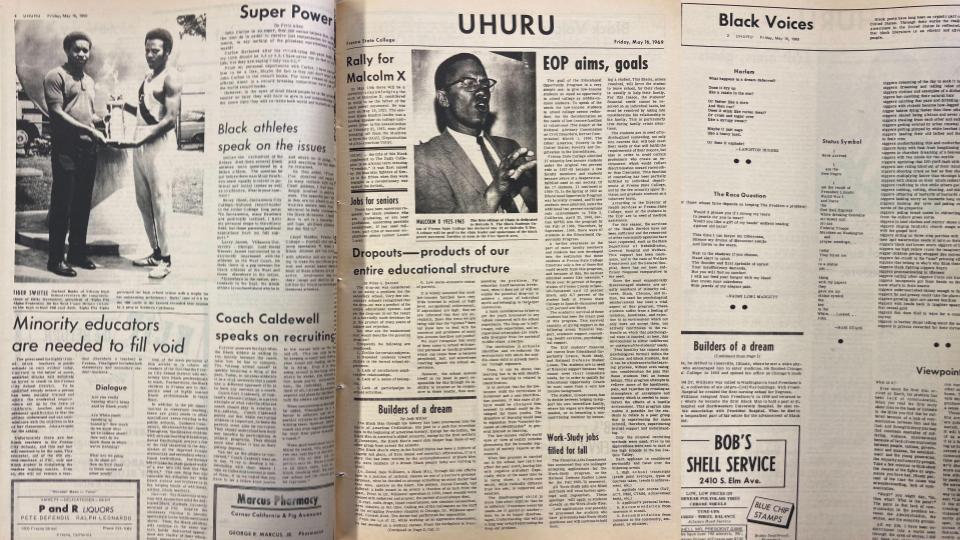This story is a continuation of The Collegian series in celebration of its centennial anniversary, which looks back at historical moments in the publication’s history.
This piece focuses on the creation of the minority supplement publications in 1968.
The minority supplements were approved by the board of publications on May 2, 1969, following a 5-to-2 vote, which received criticism from the general public and the journalism department at the time.
The vote established that the editorial processes solely reside with the students working on the supplements as opposed to having direct faculty oversight.
Six days later, the student senate voted in favor of the minority editions in a 17-to-8 vote , establishing two minority supplements that were published on a weekly basis as a special edition of The Daily Collegian.
The First Supplements
The first official minority supplement was published on May 5, 1969, under the title of La Pluma Morena, or The Black Pen, as a shared supplement between Latinx students and African American students.
The publication release coincided with the Mexican holiday Cinco de Mayo, which celebrates Mexican revolutionaries and their triumphs over the French in The Battle of Puebla in 1862.
The supplement intentionally focused on issues affecting people of color, often featuring works by local artists and poets, as well as opinion pieces by people of color. The only other minority newspaper published in Fresno at the time was the African American-run The California Advocate, which began in 1967.
This was done by design, as the editors felt that current news outlets like The Fresno Bee and even The Daily Collegian failed to grapple with the issues faced by people of color.
“This is the first Chicano black Coalition paper. Its contents and posture will and should reflect our combined points of view, for it has been granted through our efforts, yet we have also gained it for all those students who have need of it,” editor John F. Ramirez wrote in the first issue
La Pluma Morena later split into two different supplements for African American students and Latinx students. The African American students created The Uhuru and the Latinx students created La Voz De Aztlan, respectively.
The Uhuru
The African American supplement was given the name The Uhuru, which is Swahili for freedom, and was published on May 16, 1969. It is still published to this day.
In its first issue, the staff wrote “UHURU – The title of this black supplement to the Daily Collegian” on the front page.
The Uhuru staff consisted of co-editors Gloria Davis and Micheline King, campus news editors Al Williams and Dorthy Smith, city news editors Sam Germany and Rosemary Lee, sports editor Fritz Allen and advertising manager Charles Francis.
Much like La Pluma Morena, The Uhuru focused primarily on issues pertaining to the Black community at the time and publishing works of art from the community, such as drawings or poetry.
“Black poets have long been an organic part of the literature of the United States. Through their works, the realities of life for Black Americans in the United States is reflected. Their poetry shows Black literature is as vibrant and alive as that of any other people,” The Uhuru wrote.
The issue of education within the Black community was featured throughout the supplement, with articles calling for the need for Black educators, the equal opportunities program and disgusting dropout rates.
The editorial team criticized opposition to the minority supplements, reasoning that the creation of the supplements would help ease the racial tensions present throughout the country.
“If whites are really sincere about avoiding violence, then they should work jointly with the victims of racism and oppression to eliminate such conditions. However, and working with minority students, whites must begin to survey the problems and frustrations of minority students from the minority point of view,” The Uhuru wrote.
The Uhuru In The Modern Day
The Uhuru has stayed faithful to the mission statement of its predecessors, though it has adopted a new style of format both visually and reporting, unlike its predecessors
Now known as Uhuru Na Umoja, the four-page supplement is produced by editor-in-chief Dessalines Yamoussou, staff reporters Joanna Lopez, Zion Sanders, Clarence Curtis, Rashad Flood and staff adviser Angel Langridge.
Yamoussou became editor-in-chief of Uhuru during the spring 2021 semester during the COVID-19 pandemic at the start of his graduate school career in the department of history.
Yamoussou described writing for Uhuru as refreshing, allowing him to write in a creative manner.
“I love it. It gives me freedom to kind of express a creative outlet that you wouldn’t have with a school, because you know, we’re doing schoolwork, right… Typically you can put a lot of energy into [it], but with this, you know, sky’s the limit,” Yamoussou said.
He said he encourages his reporters to write about the Black experience, which he described as unaccepted in the U.S., making a newspaper supplement like Uhuru empowering to both readers and writers
“This is not something that we’re doing that isn’t going to matter. This absolutely matters, because that one Black kid who’s going to pick up the newspaper and read it and go ‘Man, like I’m having the exact same experience…’ To me, that’s the only thing that matters,” said Yamoussou.
Associated Students Inc. (ASI) President D’Aungillique Jackson shared similar sentiments highlighting the importance of minority supplements in The Collegian to help give voice to underrepresented people of color.
“It’s crucial to have those voices represented because when we talk about underserved and underrepresented populations, we commonly don’t have our voices heard. And having these papers highlight these specific minority groups gives us a chance to express ourselves, talk about our cultural backgrounds and talk about what our needs are,” Jackson said. As of the time of this writing, four ethnic supplements are budgeted to publish twice each semester: Uhuru Na Umoja, La Voz De Aztlan, Hye Sharzahoom and the Asian Pacific Review.





